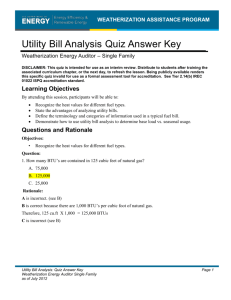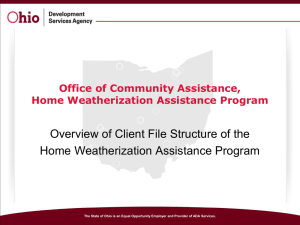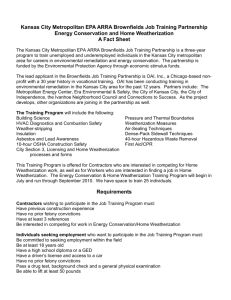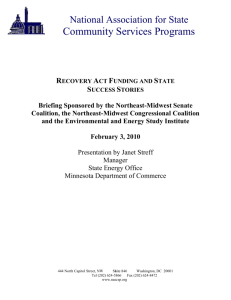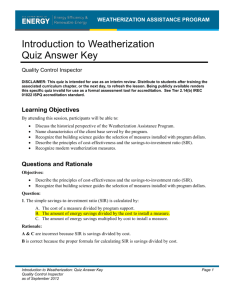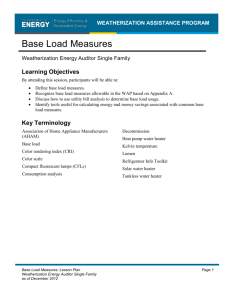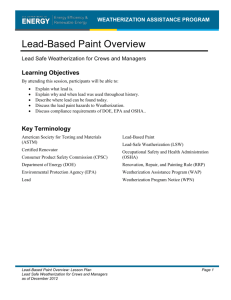PENNSYLVANIA
advertisement
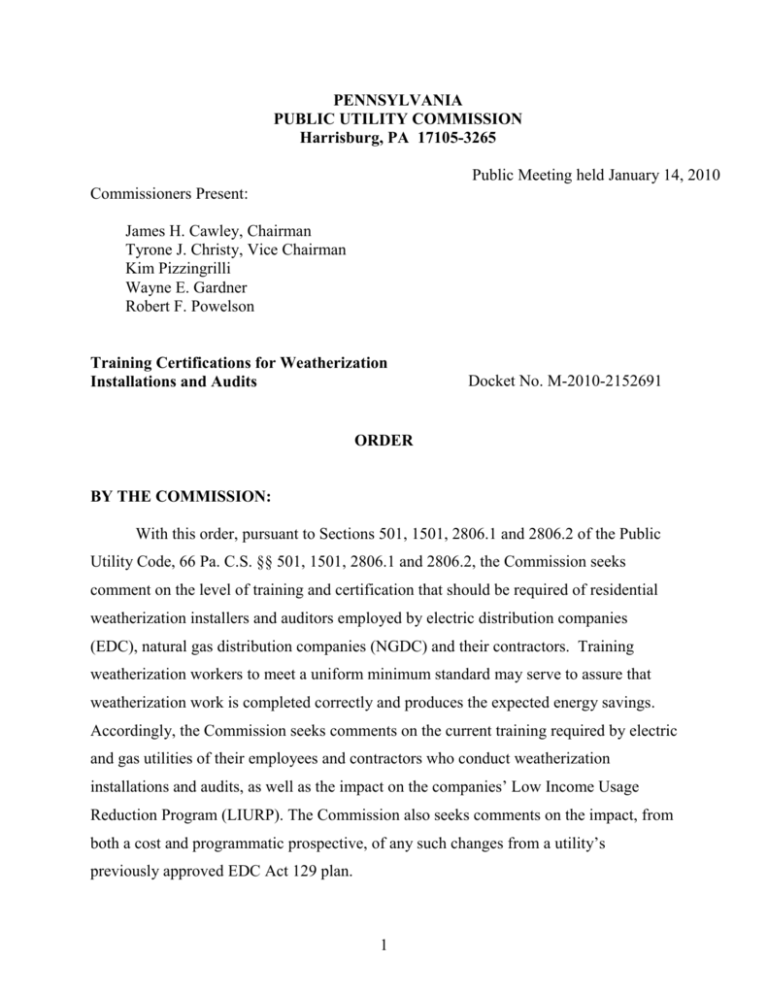
PENNSYLVANIA PUBLIC UTILITY COMMISSION Harrisburg, PA 17105-3265 Public Meeting held January 14, 2010 Commissioners Present: James H. Cawley, Chairman Tyrone J. Christy, Vice Chairman Kim Pizzingrilli Wayne E. Gardner Robert F. Powelson Training Certifications for Weatherization Installations and Audits Docket No. M-2010-2152691 ORDER BY THE COMMISSION: With this order, pursuant to Sections 501, 1501, 2806.1 and 2806.2 of the Public Utility Code, 66 Pa. C.S. §§ 501, 1501, 2806.1 and 2806.2, the Commission seeks comment on the level of training and certification that should be required of residential weatherization installers and auditors employed by electric distribution companies (EDC), natural gas distribution companies (NGDC) and their contractors. Training weatherization workers to meet a uniform minimum standard may serve to assure that weatherization work is completed correctly and produces the expected energy savings. Accordingly, the Commission seeks comments on the current training required by electric and gas utilities of their employees and contractors who conduct weatherization installations and audits, as well as the impact on the companies’ Low Income Usage Reduction Program (LIURP). The Commission also seeks comments on the impact, from both a cost and programmatic prospective, of any such changes from a utility’s previously approved EDC Act 129 plan. 1 BACKGROUND Governor Edward Rendell signed Act 129 of 2008 into law on October 15, 2008. Among other things, this Act mandates that Pennsylvania’s large EDCs – those with at least 100,000 customers – implement Energy Efficiency and Conservation (EE&C) programs1 with the intent of reducing annual weather-normalized electric consumption by at least one percent (1%) by May 31, 2011 and three percent (3%) by May 31, 2013. Additionally, Act 129 requires that energy consumption during the 100 highest hours of peak demand be reduced by a minimum of four-and-a-half percent (4.5%) by May 31, 2013. The EDCs’ EE&C plans contain a variety of energy efficiency and conservation measures, which include residential weatherization measures, designed to meet the Act 129 targets.2 In addition, EDCs and NGDCs have Commission approved Universal Service Plans that include Low Income Usage Reduction Programs (LIURP), or similar programs, that help low-income residential customers reduce the amount of electricity or natural gas they consume in a month. These types of programs also employ residential weatherization measures to assist in reducing low-income residential customers’ energy usage.3 Furthermore, the Pennsylvania Department of Community and Economic Development (DCED) administers the Pennsylvania Weatherization Program (WAP), which is designed to help low-income households decrease energy consumption and costs. WAP is open to those whose income is two hundred percent (200%) of the federal poverty income level, with priority given to higher risk residents such as the elderly, 1 Pennsylvania Public Utility Code at Sections 2806.1 and 2806.2, 66 Pa. C.S. §§ 2806.1 and 2806.2. The EDCs’ EE&C plans can be found on the Commission’s website at the following link: http://www.puc.state.pa.us/electric/Act_129_info.aspx 3 The EDCs’ and GDCs’ LIURP programs are described in their universal service plans (USP). A link to the utilities’ USPs can be found on the Commission’s website at the following address: http://www.puc.state.pa.us/general/consumer_ed/energy_asst_progs.aspx 2 2 disabled individuals, families with children and high energy users. Local county agencies administer WAP. WAP provides on-site energy audits to assess conditions in residences and identify the most cost-effective energy saving measures to be installed. The average expenditure per home is $6,500.4 ARRA provided Pennsylvania’s WAP with $252.8 million that must be fully expended by March 31, 2012.5 These resources will enable the Commonwealth to achieve greater energy independence and help vulnerable residents by reducing their energy bills. As a result of these ARRA weatherization funds, Pennsylvania will: • Reduce energy usage by the equivalent of powering about 7,000 homes a year; and6 • Weatherize at least an additional 29,700 housing units over the next two to three years.7 Under new requirements developed jointly by the Pennsylvania Department of Labor and Industry (L&I) and DCED, all workers participating in the federally funded WAP must be certified.8 In order to become a certified weatherization worker, individuals must be trained by a Pennsylvania Certified Weatherization Instructor.9 There are three certifications available for workers: installer, crew chief and auditor. More information about WAP can be found on DCED’s website: http://newpa.com/strengthen-yourcommunity/redeveloping-your-community/housing/weatherization/index.aspx 5 L & I Announcement of Grant Availability: Pennsylvania Certified Weatherization Training Provider Fiscal Year 2009-2010, p. 1. The Announcement is available in a pdf document at the following link: http://www.portal.state.pa.us/portal/server.pt?open=514&objID=607115&mode=2 6 Pennsylvania ARRA Weatherization Final State Plan at p. 1. The link to the Final State Plan can be found at the following address: http://www.recovery.pa.gov/portal/server.pt/gateway/PTARGS_0_2_60658_6016_505726_43/http%3B/p ubcontent.state.pa.us/publishedcontent/publish/marketingsites/recovery_pa_gov/content/announcements/a nnouncements_list/wx_arra_state_plan__final_approved_082809.pdf 7 Id. 8 Pennsylvania ARRA Weatherization Final State Plan at p. 8-9. 9 L & I Announcement of Grant Availability: Pennsylvania Certified Weatherization Training Provider Fiscal Year 2009-2010, p. 7. 4 3 The Pennsylvania ARRA WAP budget includes adequate funding to establish a training program for WAP agencies and for other public and private-sector weatherization providers. To implement this training, L&I is now supporting seven geographically dispersed training centers across the Commonwealth to provide weatherization training to students learning to become weatherization installers, crew chiefs and auditors. These centers will train and certify workers to complete high-quality energy reduction, conservation and weatherization activities in single- and multi-family homes across the state. In addition to the WAP program, each of our large jurisdictional electric and gas utilities has either a LIURP or similar program, which assist low-income residential customers in lowering the amount of electricity or natural gas used each month. Typically, the company will install energy saving features in the home to help reduce bills. DISCUSSION Proper weatherization of a residence is a proven way to reduce energy consumption and control utility bills. Weatherization installers and auditors who currently work in Pennsylvania have a variety of training levels and skill sets. Given the expansion of the above programs, Pennsylvania will need to train additional weatherization installers and auditors. Training weatherization workers to meet a uniform minimum standard may serve to assure that weatherization work is completed correctly and produces the expected energy savings. A uniform set of standards to qualify energy efficiency and retrofit workers may also ensure customers that work will be completed correctly and produce the expected energy savings and benefits. While workers participating in WAP funded projects will be required to complete specific training, we are interested in exploring whether utilities conducting similar 4 weatherization audits would benefit from the same training certifications. Therefore, we seek comments on the current training required by the electric and gas utility companies of their employees and contractors who conduct weatherization installations and audits, as well as the impact on companies’ existing LIURP programs. In addition, we seek comments on the impact, both cost and programmatic, of any such change in the training certification on the previously approved EDC Act 129 plans. CONCLUSION The Commission welcomes comments on the current training required by electric and gas utility companies of their employees and contractors who conduct weatherization installations and audits, as well as the impact on the companies’ LIURP. The Commission also welcomes comments on the impact, both cost and programmatic, of any such change in the training certification on the previously approved Act 129 plans of the EDCs. Interested parties will have thirty (30) days from the date of entry of the Order to file comments, with reply comments due ten (10) days thereafter. Comments should be filed with the Commission’s Secretary’s Bureau. The contact person for technical issues related to Act 129 in this Order is Scott Gebhardt, Energy Review Specialist, Bureau of Conservation, Economics and Energy Planning, (717) 425-2860 or sgebhardt@state.pa.us. The contact person for technical issues related to LIURP in this Order is David Mick, Supervisor- Energy Policy and Compliance, Bureau of Consumer Services, (717) 783-3232 or dmick@state.pa.us. The contact person for legal issues related to this matter is Stephanie Wimer, Assistant Counsel, Law Bureau, (717) 7728839 or stwimer@state.pa.us. Parties are asked to provide an electronic copy of the comments at the e-mail address listed above. THEREFORE, 5 IT IS ORDERED: 1. That interested parties shall have thirty (30) days from the date of entry of the Order to file an original and three (3) copies of written comments to the Pennsylvania Public Utility Commission, Attention: Secretary James J. McNulty, P.O. Box 3265, Harrisburg, PA 17105-3265. 2. That interested parties shall have forty (40) days from the date of entry of the Order to file an original and three (3) written reply comments to the Pennsylvania Public Utility Commission, Attention: Secretary James J. McNulty, P.O. Box 3265, Harrisburg, PA 17105-3265. 3. That the comments shall be electronically mailed to Scott Gebhardt, Energy Program Specialist, at sgebhardt@state.pa.us, David Mick, Supervisor- Energy Policy and Compliance, at dmick@state.pa.us and Stephanie Wimer, Assistant Counsel, at stwimer@state.pa.us. 4. That a copy of this Order be filed at Docket No. M-2010-2152691and served upon all electric distribution companies and natural gas distribution companies operating in Pennsylvania, the Office of Consumer Advocate, the Office of Small Business Advocate, the Office of Trial Staff, the Department of Community and Economic Development, the Department of Environmental Protection, the Pennsylvania Department of Education, the Department of Labor and Industry and Affordable Comfort, Inc. 5. That the contact person for technical issues related to Act 129 in this Order is Scott Gebhardt, Energy Review Specialist, Bureau of Conservation, Economics and Energy Planning, (717) 425-2860 or sgebhardt@state.pa.us. The contact person for technical issues related to LIURP in this Order is David Mick, Supervisor- Energy Policy and Compliance, Bureau of Consumer Services, (717) 783-3232 or dmick@state.pa.us. 6 The contact person for legal issues related to this matter is Stephanie Wimer, Assistant Counsel, Law Bureau, (717) 772-8839 or stwimer@state.pa.us. BY THE COMMISSION, James J. McNulty Secretary (SEAL) ORDER ADOPTED: January 14, 2010 ORDER ENTERED: March 2, 2010 7
